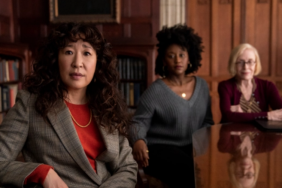Left: Cathy Park Hong; Right: Eileen Myles photographed by Catherine Opie.
Two responses to the New Yorker’s recent sloppy, misbegotten hand-job on “conceptual poet” Kenneth Goldsmith fell within days of one another. The first response, by poet Cathy Hong Park, beautifully and powerfully grows in concentric circles from the personal (a defense of herself, her name, art, politics and aesthetic) that had been shrunken and misrepresented by writer Alec Wilkinson in his fawning, politically and aesthetically reactionary defense of his friend – never acknowledged as such in the piece – Goldsmith. Hong’s response gracefully moves from and transcends the personal to grapple with the shifting universal, the ways in which race, class, gender, sexuality and social justice, as they all intersect and feed one another in the twenty-first century, are invigorating the poetry landscape in ways that outrun and outwit the status quo – a status quo that often laughably positions itself as cutting-edge and subversive.
Just past the midway point in her piece, Hong writes:
Wilkinson’s bias is a kind that journalists circulate under the ruse of objectivity in narratives where the profiled subject (often white, often male) is humanized and condemned by a cast of extras (often women, queers, and people of color). It doesn’t matter that facts contradict the narrative or how much history changes or the number of people interviewed who say, “No, that’s not how it is.” From the first sentence of the article, “To appreciate the beleaguered position that Kenneth Goldsmith finds himself in,” Wilkinson’s profile conforms to all the lazy templates: the mea culpa story of the contrite racist, the aging enfant terrible, the comeback kid who is resurfacing just in time to publicize his book (or the con artist who pulls a fast one by using racial shock tactics to win himself a New Yorker profile). Goldsmith has risen and fallen and by the end of the profile, we are to forget his shrill critics and feel compassion for the pitiable man.
What’s wonderful about that passage is the way it simultaneously names the toxins coursing through Wilkinson’s piece while also noting that its perspective and practice are the foundation of journalism, arts criticism, and the world in which we all live, artists or not. She goes on to end the piece on a note of hope:
I want to correct some of Wilkinson’s glib descriptions of Goldsmith’s critics. The Mongrel Coalition Against Gringpo, an anonymous radical entity, practices a guerilla social media activism that is its own performance art, reminiscent of the artists Guillermo Gomez Pena and Coco Fusco from twenty years ago. CAConrad is not just “white” but a brilliant poet and queer activist. They are all altering the face of American literature, among other poets who are too many to name.
Poetry is becoming progressively fluid, merging protest and performance into its practice. The era of Conceptual Poetry’s ahistorical nihilism is over and we have entered a new era, the poetry of social engagement.
Just a few days after Hong’s piece set social media aflutter, the Guardian ran a piece on the late career renaissance of iconic dyke poet Eileen Myles. The interview/career overview is well worth a read just for the reader to have the chance to bask in Myles’ worldview – an amalgam of working-class grit, fierce intellectualism, old-school socially progressive (even subversive) politics, and a generosity of heart and spirit that are at the core of her queer world view. To gauge something of her unyielding integrity as captured in the interview, check her blithe dismissal of Patti Smith’s near universally acclaimed memoir Just Kids – Myles ain’t buying the puffery with which Smith has enchanted the world.
What makes the Myles interview especially relevant is the way it underscores her and her work being in conversation with the school of poets and poetry that Hong says is the future. Myles honed her voice and craft before MFAs wreaked the havoc they’ve wreaked on the literary world. Her work is about bringing in voices and perspectives historically left on the margins. “I grew up understanding that I was smart,” she says in the article, “but also understanding that other people didn’t think so.”
When asked how to solve the contemporary (yet age old) dilemmas around being a poet – living in cities hostile to the poor, navigating a conservative literary establishment – Myles says, “People just have to blow it up.”









